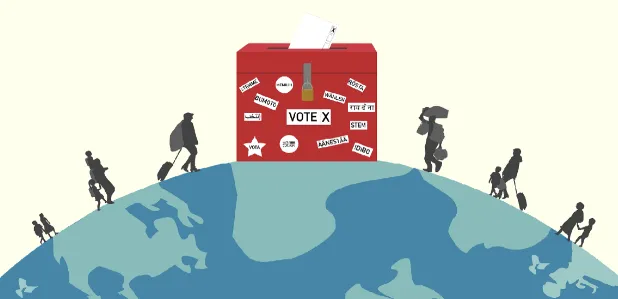
Airbnb has an alluring new option for those who want to hit the road. In a partnership with the well-known genetic testing company, 23andMe, Airbnb is inviting clients to embark on “heritage trips” for an experience that is “as unique as your DNA.” It’s an exciting promise: a vacation that offers a glimpse into your personal history, a literal walk down (ancient) memory lane. But it’s evocative in a much broader sense as well, prompting fundamental questions of who we are and where we belong.
Though it may not seem obvious, such questions of identity are increasingly important for those of us who care about democracy. As people move, whether for a trip or a more permanent shift, identity questions follow them. How does who we are relate to what we demand of and expect from democracy?
Identity on the move
Questions about identity are increasingly relevant in a diverse array of contexts. As international migration continues to surge, for example, influxes of asylum seekers, refugees, migrant workers, students and other explorers are quite literally pushing the boundaries of states. But people are also moving for reasons that reflect wants rather than needs.
This is especially clear in the aftermath of the Covid-19 pandemic, as experts declare that the future of work is hybrid. Relatedly, co-living options also abound, and more and more countries now offer dual citizenship. When we add options like the ability to buy a house or a car on Amazon, it’s easy to see that—for those who want it (and have the privilege to consider it)—mobility may be a clear and possible choice. Arguably, in fact, borders are becoming less relevant for many other reasons, including climate change, digital disinformation, outsourced services, the Covid-19 pandemic and even activity in outer space.
All these migratory flows raise questions about who belongs and what rights do or do not follow.
The Future Shape(s) of Democracy
All this has important implications for democracy, both in terms of how it is practiced and how it is understood and assessed. If our future is marked by a higher baseline level of mobility, does the idea of citizenship, which is currently tied to national borders, need a makeover? Maybe denizenship will soon be more relevant. And in cases where significant political activity happens in dispersed diaspora communities and in the digital sphere (think of exiled members of Myanmar’s National Unity Government, for example, or the Tibetan diaspora community), perhaps virtual citizenship will be necessary and useful.
In some ways, democratic institutions have long (albeit slowly) been experimenting with some of these questions. Recently, for example, the UK expanded voting rights to a wider population of its diaspora and Germany updated the criteria for citizenship.
But what would happen if citizenship was not the primary criterion for voting rights? How would that alter the face of democracy, and what would the implications be for institutions like political parties and legislatures? Could we see cross-border parties and coalitions of interest groups, as well as new forms of participation? What changes might be necessary in international human rights law?
And as crises that force people to migrate show no signs of abating, is it time to think about a model of migratory democracy? Could such a model help create more accountability for the dangers many migrants face and for the regular breaches of international law they suffer?
Finally, what do such scenarios mean for the way we evaluate democracy? Today, democracy tends to be evaluated at the national level. This is partly because comprehensive, comparable data at the local level is difficult to collect and update and because there are no institutions at the supranational level with democratic authority. But if people are no longer tied to their national identities, do we need to think about what democracy under or outside of national borders could look like? What would this shift in the lens of evaluation add?
Maybe heritage trips will one day spark their own stream of interest in multiple citizenships. What’s clear for now is that democratic legitimacy is, in so many ways, grounded in our ideas about who we are. As those evolve, let’s hope the shapes of democracy do, too.
Disclaimer: Opinions expressed in this commentary are those of the authors and do not necessarily represent the institutional position of International IDEA, its Board of Advisers or its Council of Member States.




